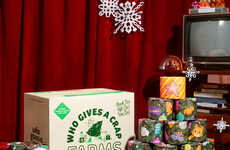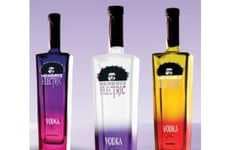
Eco-Libris Plants Trees to Offset Book Paper
Katie Cordrey — December 28, 2008 — Eco
References: ecolibris.net
If your reading habits are more 20th than 21st century, you haven’t made the switch to Kindle and can’t quite give up your print addiction, there is a way you can feel a little less guilty about the trees that go into making your newspapers, books and magazines.
Eco-Libris is a business that plants trees to offset the trees used to create books. You choose how many books you’d like to offset, pay about a buck each, and soon, trees will be planted in developing countries to compensate for the trees cut down and made into paper for your books.
The planting and conservation provide jobs, improve the environment and help create a sustainable, tree-lined future. Eco-Libris also sends a sticker that you can place on your book to show that you’ve contributed to restoring trees to the ecosystem. You can purchase Eco-Libris stickers as gifts for your book-reading friends as well.
Each year, more than 4.16 billion books are produced in the U.S.; of these, only 13% are printed using recycled paper. While more and more book publishers are signing onto green practices, there is quite a distance to go before publishing is a truly green industry.
The YouTube video above is a slide show about Eco-Libris. The captions are in French, but even if you don’t read French, you’ll get the idea. In addition, you can see the site’s plantings gallery online.
Eco-Libris is a business that plants trees to offset the trees used to create books. You choose how many books you’d like to offset, pay about a buck each, and soon, trees will be planted in developing countries to compensate for the trees cut down and made into paper for your books.
The planting and conservation provide jobs, improve the environment and help create a sustainable, tree-lined future. Eco-Libris also sends a sticker that you can place on your book to show that you’ve contributed to restoring trees to the ecosystem. You can purchase Eco-Libris stickers as gifts for your book-reading friends as well.
Each year, more than 4.16 billion books are produced in the U.S.; of these, only 13% are printed using recycled paper. While more and more book publishers are signing onto green practices, there is quite a distance to go before publishing is a truly green industry.
The YouTube video above is a slide show about Eco-Libris. The captions are in French, but even if you don’t read French, you’ll get the idea. In addition, you can see the site’s plantings gallery online.
Trend Themes
1. Eco-friendly Publishing - The trend of planting trees to offset paper production in the publishing industry creates an opportunity for publishers to promote their green practices and appeal to eco-conscious consumers.
2. Sustainable Business Models - The rise of businesses like Eco-Libris highlights the potential for sustainable business models that address environmental challenges and offer consumers guilt-free alternatives.
3. Consumer Demand for Eco-conscious Products - The increasing consumer demand for eco-conscious products, such as books made from recycled paper or supported by tree-planting initiatives, presents an opportunity for publishers and retailers to cater to this market segment.
Industry Implications
1. Publishing - The publishing industry can capitalize on the trend of eco-friendly practices and tree-planting initiatives to attract environmentally conscious readers and strengthen their brand image.
2. E-commerce - E-commerce platforms can tap into the demand for eco-conscious products by offering a dedicated category for books made from recycled paper or supporting tree-planting initiatives like Eco-Libris.
3. Environmental Conservation - The trend of planting trees to offset paper production creates opportunities for organizations in the environmental conservation field to partner with publishers, businesses, and consumers to promote sustainable practices and protect forest ecosystems.
4.5
Score
Popularity
Activity
Freshness















